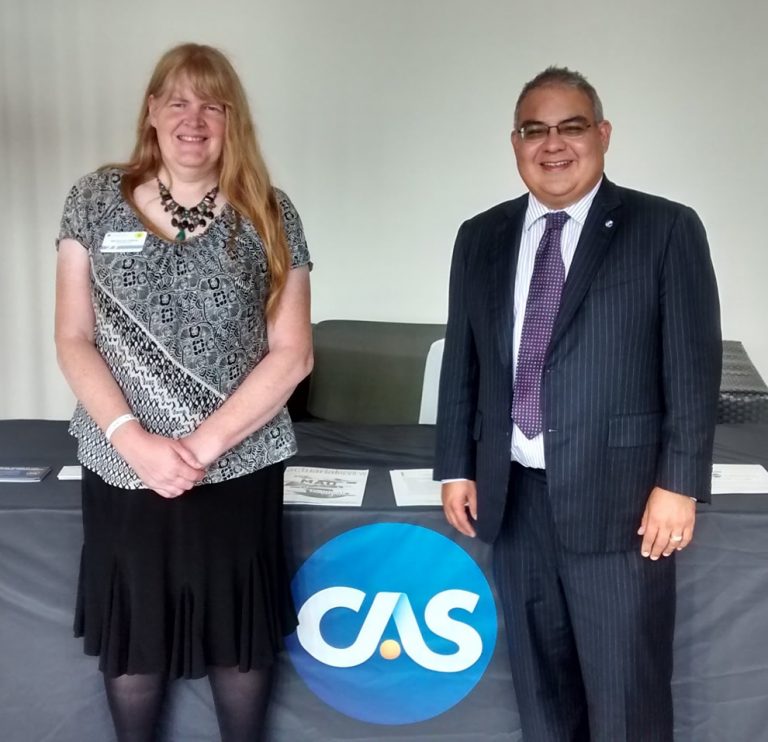
Last October, Alejandro Ortega, FCAS, packed his bag for a trip to Cancún, Mexico — not to take in the sun (he had plenty of that at his home in Miami) but to represent the CAS at the Congreso of the AsociaciÓn Mexicana de Actuarios1 (AMA, Association of Mexican Actuaries). An actuary and educator, Ortega spoke about the value of the CAS credential program and the career prospects for Mexican actuaries who pursue certification through the CAS.
Up to 2015, Ortega spent six years as AIG’s chief actuary for Latin America. He recently left that role to spend the next three years advancing the education and training of actuaries in Latin America. He also parlayed his experience into positions on some key CAS committees. Ortega recently became chair of the CAS Latin America Regional Committee and is also vice chair of the Diversity Committee. He is a CAS University Liaison and serves on the CAS International Member Services Committee and the Joint CAS/SOA Committee on Career Encouragement and Actuarial Diversity.
Recently, Actuarial Review spoke to him about his experience at the AMA Congreso.
Latin America’s Actuarial Landscape
According to Ortega, most professionals in Mexico have at least a working knowledge of English and many at the conference chose not to use the live interpretation (English to Spanish) offered when an international presentation was made. So while language may not be a huge barrier, there are some challenges facing the CAS in this region that seems ready for expansion. An increased presence there will require effort and strategy.
Some countries in Latin America, including Mexico, Argentina and Brazil, have universities that credential actuaries and developed their own professional infrastructure, while countries like Colombia and Chile are in the process of creating degree programs.
Getting Ahead of the Competition
Ortega was clear in his presentation to actuaries in Mexico: He thought that Mexican actuaries could be great assets to U.S. companies. Some of the advantages he saw for U.S. companies to hire Mexican actuaries include proximity to the U.S. (good for projects all over the Americas), lower travel costs and a small time difference. He conceded, however, that some of the reasons a U.S. company might not choose to hire Mexican actuaries include the language barrier (for those who have yet to learn English) and the lack of international credentials, which are considered important in the U.S. actuarial market — an issue that can be resolved by passing the CAS exams.
Promoting the Value of the CAS Credential
But of course, part of Ortega’s mission was to present a convincing argument for pursuing the CAS credential — telling the conference audience why U.S. companies should welcome them was only part of the equation. Ortega explained that they should put in the effort necessary to pass the CAS exams for the international experience. Along with opportunities to broaden their knowledge base and travel internationally, there would likely be opportunities to travel regionally. Ortega also told conference attendees that Mexican actuaries who work for U.S. companies also stand to receive better pay and more opportunities to be promoted.
But not all actuaries in Mexico are looking to launch international careers. A challenging part of Ortega’s talk at the Congreso was to impress upon his audience the benefits of taking the CAS exams even if they decided to remain in Mexico.
Ortega thinks the U.S. heavily values credentials like those acquired through the CAS, but for Mexico the focus is on the degree. Many Mexicans who get actuarial degrees do not work in insurance; they may work in related areas, analyzing demographic data, election analysis, finance and statistics or doing risk assessment for a bank, for example.
Studying for the CAS exams requires diligence. The more than seven universities that offer an actuarial degree allow students to bypass writing a thesis if they pass three of the actuarial exams. Thus, many students in Mexico take these exams, but they do not continue on to the practical exams that deal with how an actuary actually does his job, such as Exams 5 and 7.
One of the challenges to convince actuaries to pursue a CAS credential is the nation-specific Exam 6 (U.S., Canada or Taiwan). It isn’t clear to an actuary in Mexico why they need to know U.S. GAAP accounting rules and U.S. regulations. It’s a valid point. On the other hand, the rest of the upper exams are highly relevant, but the market in Mexico is not familiar with them.
In addition to helping Latin Americans see the significance of continuing past the first few exams, Ortega thinks offering study materials in Spanish would sway more actuarial students. While it is important to learn English terms used in the profession, the concepts could be taught in Spanish so students can digest them in their native language first.
Job Prospects
With Ortega looking to help actuaries in Mexico and Latin America increase their knowledge and become more marketable, a question arises: Will there be enough work if the region produces more actuaries? Ortega says that while it is possible that there may be more graduates than jobs, right now the region’s best graduates are not necessarily ready for the international arena. He wants to see them become more competitive.
Ortega says there are working actuaries who do see the value of the CAS exams. With time and effort the perceived value of pursuing the CAS credentials will increase as companies in the region work with actuaries who have passed the exams. Then the companies can see for themselves the depth of their knowledge.
Educating Leaders in the Profession
Before becoming an actuary, Ortega was a computer programmer. He had ideas that were overlooked because his thoughts went beyond his assigned role. Looking for a new profession led him to become an actuary because he likes “math and working with people and being involved in the decision-making process.”
The drive that led him to pursue the switch to the actuarial field is also what is behind his desire to help actuaries in Latin America strengthen the profession in that region. Ortega says that right now actuaries in Mexico are not at the leadership table and not included in the decision-making process. He observed that actuaries in the U.S. may have been in a similar position about three decades ago and that it took a decade to change that. More education would help Mexican actuaries be in a position to offer more leadership.
“Well-trained actuaries are a must,” he says. “Communication and technical skills prove that you add value and that you are not just a number cruncher.”
Jada Bradley is a freelance writer, editor and translator living in Arlington, Virginia. She is the author of U.S. Territories and Possessions, part of the series for young readers “Let’s Explore the States.”













